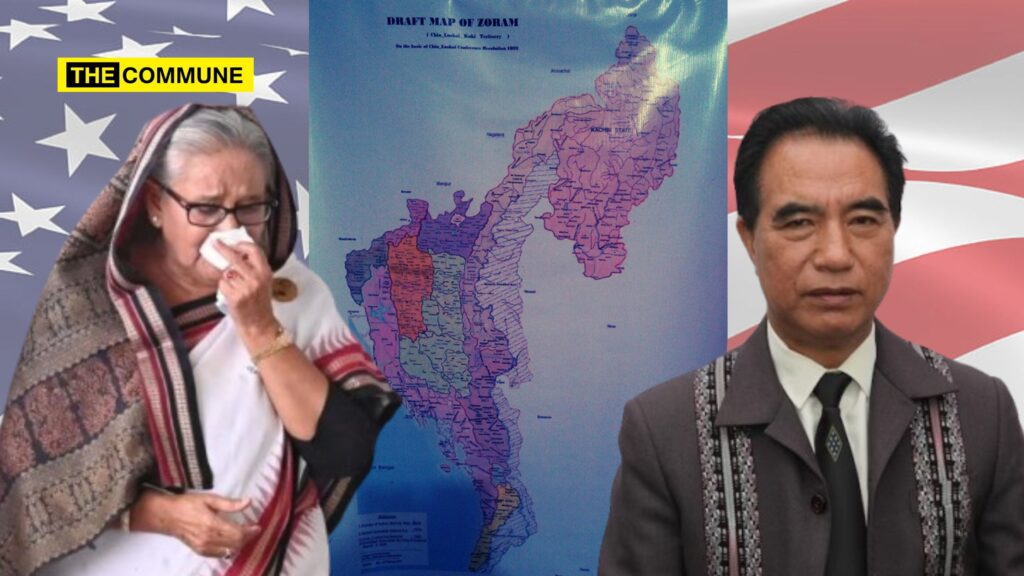On 4 September 2024, Mizoram’s Chief Minister PU Lalduhoma delivered a “seemingly” powerful speech in Indianapolis, USA, advocating for the unity of the Chin-Kuki-Zo people—ethnic communities spread across India, Myanmar, and Bangladesh. His remarks called for these tribes to unite under a shared cultural and religious identity, transcending the national borders currently dividing them.
Lalduhoma’s message, urging “one leadership to achieve our destiny of nationhood,” emphasized their vision of a single homeland for the Chin-Kuki-Zo people, a notion that has raised concerns about a possible separatist movement with far-reaching implications for regional stability.
Lalduhoma’s address centered on the idea that these communities were “unjustly divided” across three countries and must come together to reclaim their “destiny of nationhood.” For many, his rhetoric went beyond a cultural message, suggesting a political unity that challenges existing boundaries in South Asia. His appeal to shared religious and ethnic bonds carries significant implications, particularly given the region’s history of ethnic tensions and separatist movements.
Mizoram CM Lalduhoma mentioned his desire to create a Christian nation including parts of Bharat, Bangladesh & Myanmar in an official statement at the US on 04.09.2024
The dominance of Church in local politics & the creation of the fictional "Kuki-Chin-Mizo" identity based on pic.twitter.com/MbqUjq9pXd
— Vladimir Adityanath (@VladAdiReturns) November 3, 2024
He said, “It’s just like a two-way traffic. As far as we are concerned, we shall never ever accept the division of our people into 3 countries. This will never be acceptable. The boundaries are imposed boundaries by the British government. In that committee, we are never represented, we are never consulted. Therefore, it is an imposed boundary and will never accept it. We will never accept construction of a border fencing between us.”
Mizoram CM PU Lalduhoma gives a call during the US tour for a united Chin-Kuki-Zo Nation, while appealing for unity among culturally linked tribes across India, Bangladesh, & Myanmar.
A Separatist Agenda to Divide Northeast India? A call for Nationhood? pic.twitter.com/NN9OI2Y7Dg
— Megh Updates 🚨™ (@MeghUpdates) November 4, 2024
This vision for a unified Chin-Kuki-Zo nation has set off alarm bells among observers who worry it could encourage separatist sentiment and destabilize the region. Lalduhoma’s speech has raised questions about whether external powers might be supporting this movement, echoing recent statements by former Bangladeshi Prime Minister Sheikh Hasina, who warned of alleged foreign interference aiming to reshape South Asia’s geopolitical landscape.
Hasina’s comments, made just before her removal from office in a political coup on 5 August 2024, highlighted concerns about Western intentions to support the establishment of a Christian-majority state in the region. According to Hasina, a Western official had explicitly outlined plans to carve out an independent Christian nation from parts of Bangladesh, Myanmar, and India—a proposal Hasina compared to the East Timor model. Hasina suggested that this “Christian state” project could exploit the ethnic and religious divisions in South Asia, destabilizing the area to serve strategic interests.
Following Lalduhoma’s Indianapolis speech, Hasina’s statements have gained new relevance. The former Prime Minister had suggested that Western influence, potentially aligned with church groups in the United States, could be backing aspirations for a “Zo” homeland. This proposed homeland, commonly called “Zoram,” would cover areas of Bangladesh, Myanmar’s Chin State, and India’s Mizoram and Manipur states, where the Chin-Kuki-Zo people predominantly reside. The push for this unified state has reportedly garnered support from various church organizations in the U.S. and is being championed by the Zo Reunification Organization (ZRO) in Mizoram, which has political backing from local parties like the Zoram People’s Movement (ZPM) and the opposition Mizo National Front (MNF).
The Chin-Kuki-Zo tribes’ movement, which has been gaining momentum, is not without militarized factions. Groups such as the Chin National Army (CNA) in Myanmar, the Kuki National Front (KNF) in India, and other affiliated factions have been actively seeking autonomy, with violent actions occurring in their respective regions. Lalduhoma’s speech in the U.S. has fueled apprehensions that Western powers could be taking advantage of these separatist sentiments to push for broader geopolitical interests.
Hasina’s revelation about alleged foreign intentions to establish a Christian state underscores existing concerns about sovereignty and national integrity. Her statement that a U.S. official had sought permission for an American air base on Bangladesh’s St. Martin’s Island in exchange for Western support in her administration indicates deeper regional interests. Although she rejected the offer, Hasina’s warnings highlight the broader strategy that some analysts suggest underpins Lalduhoma’s call for a unified Chin-Kuki-Zo nation.
The Northeast region of India, where Mizoram and Manipur are located, has long been a hotspot of ethnic diversity and political fragility. Observers fear that Lalduhoma’s Indianapolis speech, with its appeal for a Christian-majority state, might resonate with existing ethnic militancy and lead to intensified demands for autonomy. Combined with Hasina’s claims of Western-backed agendas, this narrative points to a strategic interest that could have ramifications for India, Myanmar, and Bangladesh alike.
The coincidence of Lalduhoma’s call for unity among the Chin-Kuki-Zo people and Hasina’s warnings about Western ambitions to redraw borders are extremely concerning.
Subscribe to our channels on Telegram, WhatsApp, and Instagram and get the best stories of the day delivered to you personally.

